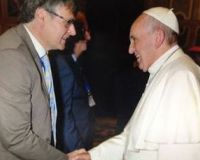Public religion report is recipe for social breakdown, says Lapido CEO
by - 7th December 2015
 THE Living with Difference: Community, Diversity and the Common Good report was published today, two years after the Woolf Institute assembled its Commission on Religion and Belief in British Public Life (CORAB) to investigate.
THE Living with Difference: Community, Diversity and the Common Good report was published today, two years after the Woolf Institute assembled its Commission on Religion and Belief in British Public Life (CORAB) to investigate.
But although Lapido Media – who contributed to the report – welcomed some of the recommendations around media responsibility, there was disappointment with its conclusions.
Dr Jenny Taylor, Lapido Media’s CEO, said: ‘This report merely continues the half-century-long war of attrition against the Christian character of the country.
‘By effectively saying that the public space is "pluralist", it further privatises any one expression of faith as true.
‘The report makes no attempt to acknowledge or appreciate the debt the nation’s public life owes to Christianity.
‘Perhaps the incoherence was unintended, but the outcome effectively makes a religion of having no religion-in-particular, and the effects of that are worrying.
‘It is naïve to believe that a new set of fundamental values to underpin public life can be determined merely by pooling the ethical aspirations of all faith and ethical traditions in the nation.’
The brainchild of the Woolf Institute in Cambridge - who sponsored the process and published the report - it is the result of a process of consultation under the nominal chairmanship of lawyer, Baroness Elizabeth Butler-Sloss.
Among the recommendations that Lapido Media welcomed are:
• A call for ’much greater religion and belief literacy being needed in every section of society, and at all levels’.
• the suggestion of a panel of experts should be established to advise the Independent Press Standards Organisation on religious coverage.
• an annual awards scheme to recognise and celebrate best religious literacy practice in the media was included as a priority in the report. This was Lapido’s own suggestion.
But there was scepticism about much of the report’s other contents, which appear to have been guided by an overtly pluralist agenda.
Dr Taylor said she believed it undermined the ethical and spiritual foundations of the nation, on which the Commission clearly depended for its own status and convening power. Baroness Butler-Sloss is Anglican, and the former Archbishop of Canterbury was one of four Patrons. The other three were Lord Parekh, Lord Woolf, and Sir Iqbal Sacranie.
Taylor said the commission had missed a golden opportunity to reinforce the binding nature of the nation’s time-honoured institutions, and instead appeared to want to consign them to history.
‘It is important to recognize changing demographics as this report does, but secular pluralism is an agenda where all faiths count but none too much and that’s a recipe for social breakdown’, she said.
Read the report here>>
